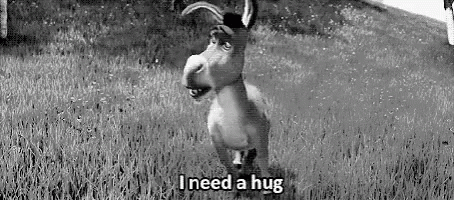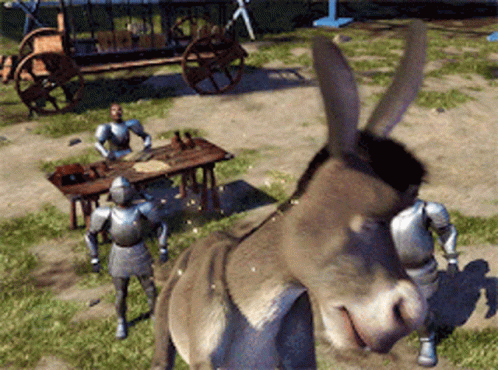Of Donkeys And G.O.A.T.s

I do not have "main character energy." Having been raised with minimal positive reinforcement, I can't take a compliment or thrust myself into the spotlight without intense anxiety. And I think that's most of us: we know that we're not the main character, that we're comfortably average.
That's why Office Space is one of my favorite movies because not only is it hilarious and shows how white-collar work hasn't changed in 20+ years since it came out, I've never empathized with a main character more.
Office Space is iconic for many reasons: it's the source of many internet memes and gif-able moments and is seemingly timeless in its' critique, but it's especially powerful because of how well it captures the exhaustion of corporate life. Peter (the main character) has some terrible managers that exemplify this internet story:
My boss arrived at work in a brand-new Porsche. I told him: "Wow, that’s a nice car." He replied: "If you work hard, put all your hours in, and strive for 'Excellence', I'll get another one next year."
The first half is the carrot that's dangled in front of employees: Do what you're told, and maybe one day you too can be rich and successful like me! The second half is the stick of reality: most people aren't actually going to get there. This observation has me thinking deeply about what it means to become successful: In order to become great, we need to change what we do under the guidance of someone closer to greatness than ourselves.
The hamster wheel isn't the best analogy for what it means to be an employee in the modern age because there are no consequences for the hamster if it doesn't run on the wheel, aside from obesity. (Side note: Google "fat hamsters" if you want to see something hilarious). A better analogy for the modern worker is that of a donkey. The archetype of a donkey is Shrek's annoying sidekick foolish, caught between a stick and a carrot, who works very hard and carries great burdens for very little payoff.

The advice that's given to the modern worker is either that of hustle culture (work harder than everyone else) or productivity hacks (work smarter than everyone else). But fundamentally, most life coaches/career counselors/self-help gurus are saying some version of "Just do what I did, and you'll be just as successful as me!"
While it's certainly true that there are principles that lead to success (taking care of your body, managing stress well, treating others kindly, focusing on your work, etc.), most advice only speaks to the external actions that manifest those principles. This sort of blanket advice ignores the personal challenges and situations that you're going through and have gone through. This is the prosperity gospel of the working world.
Going deeper than what people do is understanding how and why they do it. The most successful self-help books sit here, giving people principles they can live by that will lead them to success.
I use the phrase "prosperity gospel" as a stand-in for the belief that the world is transactional: a specific amount of success comes with a specific amount of sacrifice. This is impersonalism at its highest: the world is just a system to be gamed. The phrase originates in many spiritual movements, where the promised payoff of a materially wealthy life lures people in.
The prosperity gospel comes from being more concerned with the external outcomes of following any prescriptive life philosophy/systematic spiritual practice. The internal outcomes are the ones that lead to the highest levels of success, but the difference in motivation is easy to miss.
One easy way to understand what outcomes you're concerned with is by asking yourself: Why do I want to be successful?
- Prioritizing the external outcomes sounds like: "Become successful so that other people follow you!"
- Prioritizing the internal outcomes sounds something like: "If I'm successful, that's great! But I'm more concerned with getting better for myself."
It's the difference between chasing excellence vs. chasing success. Greatness comes from being interested in the process for the process. Here's a simple example: I can hit the gym because I want to have big arms or because I want to be healthy. Chasing success is exercising just for the biceps, so as soon as I have biceps, I'm going to stop working out so much. But if I'm working out for health, I can keep at it!

The prioritization of outcome over process indicates our fear of living at the extremes. Following any process well means sacrificing something that other people around you may not be comfortable with. Going against the grain of what is acceptable by those around us is scary, especially when you look for their approval.
But greatness is found in the extremes; to be merely good is cowardice. It's possible to be great but terrible, but to be just good is average, and average is boring. We all have great goals - find me someone who doesn't want to be extraordinary! - but we refuse to follow non-average processes. You can have a great goal, but you'll get average results if you take an average process. If you do what you've always done, you're going to get what you've always gotten.

I love this framing of what it means to improve because it drives home two points. First, the process matters more: The goal isn't to get 3700 times better in a year: it's to get 1% better each day. Secondly, we need to know in which direction we should go 1% in!
So we have to change something. All of us need to make the decision of which direction we want to move our lives. More often than not, the things we typically make our lives revolve around (money, power, fame, etc.) are external. What satisfies us on the deepest level comes from following the internal calling of our deepest self, and the greatest service we can do for others is to allow them and support them in that calling.
In my spiritual tradition, there's a story about a donkey. This donkey owned a fruit farm but refused to let anyone pick and eat the fruits on the farm - not even him! Most of us - myself included - have a stubborn, mule-like tendency to refuse to let others pursue their callings and won't let ourselves pursue our own callings either. If those are the only people we surround ourselves with, we'll end up living the donkey lifestyle: working very hard with little to show for it.
We need proper guidance on which direction to move because the unfortunate reality is that most of us are average and, therefore, are surrounded by average people. If we want to be great, we need the guidance of the G.O.A.T.s or those who are closer to our goal of Greatness™.

It's important to identify those people in our lives that we consider guides and mentors and to hear their instructions with a mood of understanding the principles behind what they're saying. Otherwise, we'll end up like Donkey: thinking we can fly but falling on our faces.
Happy to be here,
-Sid




